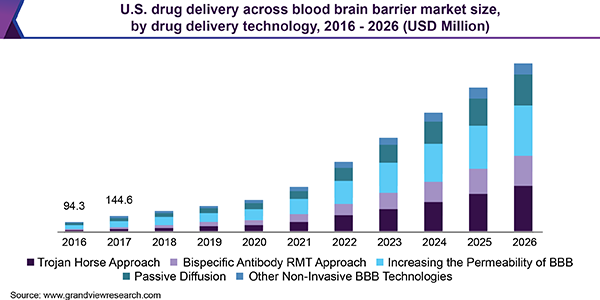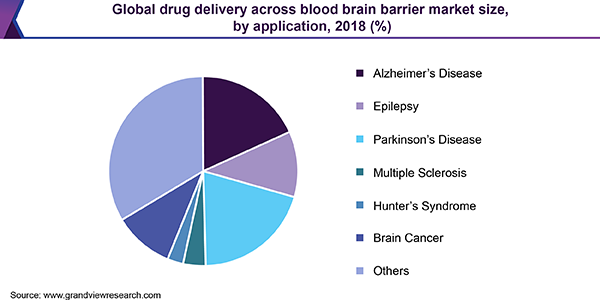- Home
- »
- Medical Devices
- »
-
Drug Delivery Across Blood Brain Barrier Market Size Report, 2030GVR Report cover
![Drug Delivery Across Blood Brain Barrier Market Size, Share & Trends Report]()
Drug Delivery Across Blood Brain Barrier Market Size, Share & Trends Analysis Report By Drug Delivery Technology (Trojan Horse, Bispecific Antibody RMT), By Application (Alzheimer’s), By Region, And Segment Forecasts, 2024 - 2030
- Report ID: GVR-3-68038-824-4
- Number of Report Pages: 100
- Format: PDF, Horizon Databook
- Historical Range: 2018 - 2022
- Forecast Period: 2024 - 2030
- Industry: Healthcare
Report Overview
The global drug delivery across blood brain barrier market size was valued at USD 1.82 billion in 2023 and is projected to grow at a compound annual growth rate (CAGR) of 5.0% from 2024 to 2030. The market growth worldwide is driven by the growing incidence of neurological disorders, increasing demand for effective treatments, and technological advancements, as pharmaceutical companies collaborate with platform providers to expand their therapeutic pipelines.

The increasing prevalence of diseases such as Alzheimer’s, Parkinson’s, and brain tumors is a primary driver of market demand, with over 6 million individuals affected by Alzheimer’s Disease (AD) in the U.S. in 2024, as reported by the NCBI. This figure might increase to 13.8 million by 2060, unless there are advancements in healthcare to stop or treat AD. This unmet medical need is driving demand for new drugs capable of crossing the blood-brain barrier, thereby enhancing treatment outcomes for patients suffering from these debilitating conditions.
Technological advancements in drug delivery technologies are also driving market growth. Innovations such as nanoparticle-mediated delivery, focused ultrasound, and molecular Trojan horses aim to improve the efficacy of treatments for Central Nervous System (CNS) disorders and are attracting substantial investment and research activity. These advancements are facilitating the development of novel drug delivery systems that can overcome the selective permeability of the blood-brain barrier.
In addition, increased research and development activities are driving market growth. Collaborations between drug developers and technology providers are fostering innovation in therapeutic delivery systems, while regulatory bodies are increasingly supportive of novel drug delivery methods that target CNS disorders. The presence of established pharmaceutical companies with advanced manufacturing capabilities is also contributing to market growth by facilitating extensive clinical trials necessary for regulatory approval.
Drug Delivery Technology Insights
Increasing the permeability of BBB held the largest market revenue share of 33.9% in 2023. The Blood-Brain Barrier (BBB) can be temporarily modified to enhance drug delivery by disrupting its tight junctions. Techniques such as targeted ultrasound and osmotic substances can achieve this. Moreover, passive diffusion employs lipophilic drugs that dissolve in the BBB’s lipid layers, allowing for passive entry into brain tissue, albeit limited to small, lipid-soluble compounds.
The trojan horse approach is expected to register the fastest CAGR of 8.7% during the forecast period. This approach leverages molecules that mimic natural substances or bind to BBB receptors, deceiving the barrier into allowing the drug to pass. This strategy is particularly valuable as it enables the transport of large molecules, which would otherwise be restricted by the BBB’s selective permeability.
Application Insights
Parkinson’s disease dominated the market and accounted for a share of 20.0% in 2023, driven by the need for innovative methods to treat the degenerative condition, which involves the destruction of dopaminergic neurons. Advanced drug delivery technologies and R&D efforts are necessary to ensure targeted delivery of therapeutic agents to affected brain regions, addressing current treatment limitations and growing demand.

Hunter’s syndrome is projected to grow at the fastest CAGR of 8.7% over the forecast period, as this disorder presents a significant challenge for drug delivery. The need to address neurological symptoms is increasingly recognized, and enzyme replacement therapy with recombinant idursulfase is expected to drive growth in the segment by improving symptoms and addressing a previously underserved area of medical need.
Regional Insights
North America drug delivery across blood brain barrier market led the global market with 35.9% of the total revenue share in 2023. Several factors lead to the region’s market dominance, such as the presence of established drug developers with robust manufacturing capabilities. The region’s advanced healthcare infrastructure and research capabilities also enable thorough clinical trials, meeting the stringent regulatory standards of approval agencies, thereby facilitating the development and commercialization of innovative drugs.
U.S. Drug Delivery Blood Brain Barrier Market Trends
The drug delivery across blood brain barrier market in the U.S. dominated the North America market in 2023. The country offers incentives for rare disease drug development, encouraging investment in BBB drug delivery for conditions such as Hunter’s Syndrome. The FDA’s accelerated approval process and focus on early detection and intervention in neurological disorders drive demand for innovative treatments, fostering market growth.
Europe Drug Delivery Blood Brain Barrier Market Trends
The Europe drug delivery across blood brain barrier market was identified as a lucrative region in 2023. The region’s emphasis on healthcare innovation and substantial public and private funding in biotech and pharmaceuticals drive market expansion. European researchers have made notable advancements in developing Nano carriers for effective BBB drug delivery, with companies such as UK-based Nano carrier Systems leading the charge in this technology.
The drug delivery across blood brain barrier market in Germany is expected to grow rapidly in the coming years. German researchers have demonstrated expertise in nanotechnology, yielding innovative drug delivery systems capable of penetrating the BBB. The German Brain Initiative has invested in research programs to overcome BBB delivery challenges, resulting in several breakthroughs in nanoparticle-based drug delivery systems, driving advancements in the field.
Asia Pacific Drug Delivery Blood Brain Barrier Market Trends
Asia Pacific drug delivery across blood brain barrier market is anticipated to witness significant growth due to rising incidence of neurological disorders and susceptibility of senior citizens to brain and CNS illnesses. Moreover, the region’s growth will be fueled by the development of medicinal tourism and long-term care facilities, increased healthcare costs, and rising awareness of chronic neurological disorders.
The drug delivery across blood brain barrier market in China is expected to grow rapidly in the coming years due to the country’s rapidly aging population, which is driving the incidence of neurodegenerative diseases such as Alzheimer’s and Parkinson’s. In addition, modern lifestyles and urbanization have contributed to increased mental health disorders, creating a demand for effective treatments and innovative drug delivery solutions.
Key Companies & Market Share Insights
Some key companies in drug delivery across blood brain barrier market include Ossianix; Insightec; Angiochem Inc.; Armagen Pharmaceuticals; and others. Companies are leveraging expansion strategies to counter competition, including acquisitions and collaborations with major firms, to enhance customer engagement and maintain market leadership.
-
Ossianix develops BBB penetrating antibodies utilizing single-domain VNAR technology from sharks. The company’s proprietary technology enables biomolecules to cross the BBB, exemplified by its CD20 antibody product, which targets multiple sclerosis and cerebral lymphoma treatments.
-
Armagen Pharmaceuticals develops innovative therapies for neurological disorders, leveraging its proprietary technology to deliver treatments across the blood-brain barrier. This enables effective treatment of conditions such as LSDs, Alzheimer’s, and Parkinson’s, offering improved outcomes for patients with neurodegenerative diseases.
Key Drug Delivery Across Blood Brain Barrier Companies:
The following are the leading companies in the drug delivery across blood brain barrier market. These companies collectively hold the largest market share and dictate industry trends.
- Ossianix
- Insightec
- Angiochem Inc.
- Armagen Pharmaceuticals
- BrainsGate
- BioCT
- Carthera
- F. Hoffmann-La Roche Ltd
- Iproteos SL
Recent Developments
-
In April 2024, Roche announced that its Elecsys pTau217 assay received FDA Breakthrough Device Designation, a collaborative achievement with Eli Lilly to develop a blood test for amyloid pathology diagnosis, enhancing Alzheimer’s care.
-
In February 2024, Insightec developed a therapy utilizing MR-guided focused ultrasound to target and eliminate Parkinson's motor symptoms, providing substantial relief without anesthesia, a non-invasive procedure.
-
In January 2024, Insightec reported a successful clinical study on Alzheimer's treatment using focused ultrasound technology, demonstrating accelerated beta-amyloid plaque reduction in collaboration with WVU Rockefeller Neuroscience Institute.
Drug Delivery Across Blood Brain Barrier Market Report Scope
Report Attribute
Details
Market size value in 2024
USD 1.90 billion
Revenue forecast in 2030
USD 2.55 billion
Growth rate
CAGR of 5.0% from 2024 to 2030
Base year for estimation
2023
Historical data
2018 - 2022
Forecast period
2024 - 2030
Quantitative units
Revenue in USD billion and CAGR from 2024 to 2030
Report coverage
Revenue forecast, company ranking, competitive landscape, growth factors, and trends
Segments covered
Drug delivery technology, application, region
Regional scope
North America, Europe, Asia Pacific, Latin America, MEA
Country scope
U.S., Canada, Mexico, UK, Germany, France, Italy, Spain, Denmark, Sweden, Norway, Japan, China, India, Australia, South Korea, Thailand, Brazil, Argentina, South Africa, Saudi Arabia, UAE, Kuwait
Key companies profiled
Ossianix; Insightec; Angiochem Inc.; Armagen Pharmaceuticals; BrainsGate; BioCT; Carthera; F. Hoffmann-La Roche Ltd; Iproteos SL
Customization scope
Free report customization (equivalent up to 8 analysts working days) with purchase. Addition or alteration to country, regional & segment scope.
Pricing and purchase options
Avail customized purchase options to meet your exact research needs. Explore purchase options
Global Drug Delivery Across Blood Brain Barrier Market Report Segmentation
This report forecasts revenue growth at global, regional, and country levels and provides an analysis of the latest industry trends in each of the sub-segments from 2018 to 2030. For this study, Grand View Research has segmented the global drug delivery across blood brain barrier market report based on drug delivery technology, application, and region.
-
Drug Delivery Technology Outlook (Revenue, USD Million, 2018 - 2030)
-
Trojan Horse Approach
-
Bispecific Antibody RMT Approach
-
Increasing the Permeability of BBB
-
Passive Diffusion
-
Other Non-Invasive BBB Technologies
-
-
Application Outlook (Revenue, USD Million, 2018 - 2030)
-
Alzheimer’s Disease
-
Epilepsy
-
Parkinson’s Disease
-
Multiple Sclerosis
-
Hunter’s Syndrome
-
Brain Cancer
-
Others
-
-
Regional Outlook (Revenue, USD Million, 2018 - 2030)
-
North America
-
U.S.
-
Canada
-
Mexico
-
-
Europe
-
UK
-
France
-
Germany
-
Italy
-
Spain
-
Denmark
-
Sweden
-
Norway
-
-
Asia Pacific
-
Japan
-
China
-
India
-
Australia
-
South Korea
-
Thailand
-
-
Latin America
-
Brazil
-
Argentina
-
-
Middle East and Africa (MEA)
-
South Africa
-
Saudi Arabia
-
UAE
-
Kuwait
-
-
Share this report with your colleague or friend.
![gvr icn]()
NEED A CUSTOM REPORT?
We can customize every report - free of charge - including purchasing stand-alone sections or country-level reports, as well as offer affordable discounts for start-ups & universities. Contact us now
![Certified Icon]()
We are GDPR and CCPA compliant! Your transaction & personal information is safe and secure. For more details, please read our privacy policy.
We are committed towards customer satisfaction, and quality service.
"The quality of research they have done for us has been excellent."





